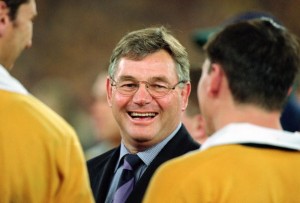
Full flight: Brian O'Driscoll busts Queensland's line in 2001, a match that prompted an Aussie fightback in the press
By Deputy Editor Alan Pearey
STICKS AND STONES may break my bones but words will never hurt me. The Australians have been making a mockery of that adage for years, no nation being wiser to the power of psychological warfare in sporting combat.
Whereas in cricket the Aussies’ ‘sledging’ of opponents takes place largely at the wicket, rugby’s high-octane nature means on-field verbal jousting is comparatively rare. It’s through the media that points can be scored and skirmishes won.
In 1989 the Wallabies reacted furiously to losing the second Test by heaping pressure on the match officials for the decider in Sydney. “The third Test could develop into open warfare,” warned skipper Nick Farr-Jones. “The Lions have set the rules and the standards and, if the officials are going to do nothing about it, then we’re going to have to do it ourselves.”
The ARU issued a press release condemning violence in the game and compiled a video of ‘incidents’ from the second Test to send to the Four Home Unions committee. Little good it did them – they lost the series – but the lessons were stored and when the Lions returned in 2001, this time they got their retaliation in early.
After the Lions crushed Queensland Reds 42-8, Eddie Jones, coach of next opponents Australia A, said he was disappointed by the amount of foul play in the Queensland game and urged match officials to “keep an eye on it” when the Lions met his side at Gosford. It did the trick, Kiwi ref Paul Honiss awarding a 24-9 penalty count against the Lions in the Australia A match.
Bob Dwyer, the NSW coach, spoke of the Lions’ ‘illegal’ play at the breakdown and demanded more yellow cards, while Wallabies coach Rod Macqueen complained that the Lions were twisting the scrum before the put-in and attacking lineout jumpers in mid-air.
And it wasn’t just words being used against the Lions. In his book Final Word, Sir Graham Henry points out that his squad was allocated training grounds with no privacy and that sessions were videoed; that the design of the Melbourne changing room meant he couldn’t see many of his players when he spoke to them; that the ARU made it difficult for Lions fans to obtain tickets and then, in Sydney, turned out the stadium lights in sections where the visiting fans were!
Henry believes that 80% of sport is played in the mind. So this week I asked Warren Gatland if he thought Robbie Deans, his adversary, would indulge in a war of words as previous Wallaby coaches have before him – or whether Deans, as a fellow Kiwi, might opt out of such shenanigans?
Gatland paused before answering, and then referred to the Evening Standard interview that he says misconstrued his comments about the effect of a large English contingent in the Lions squad. “I was annoyed by that guy, who knows nothing whatsoever about rugby, and I was rattled for a few days,” admitted the Lions coach.
“So, in Australia we must be prepared for anything; from coaches or former coaches or former players. We wouldn’t be doing our job properly if we weren’t.”
And so it begins.






